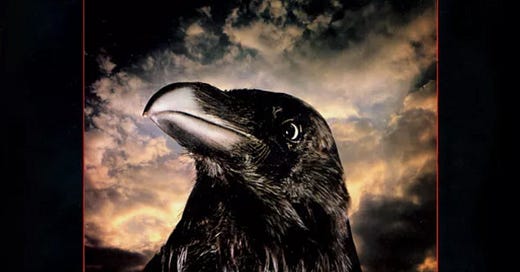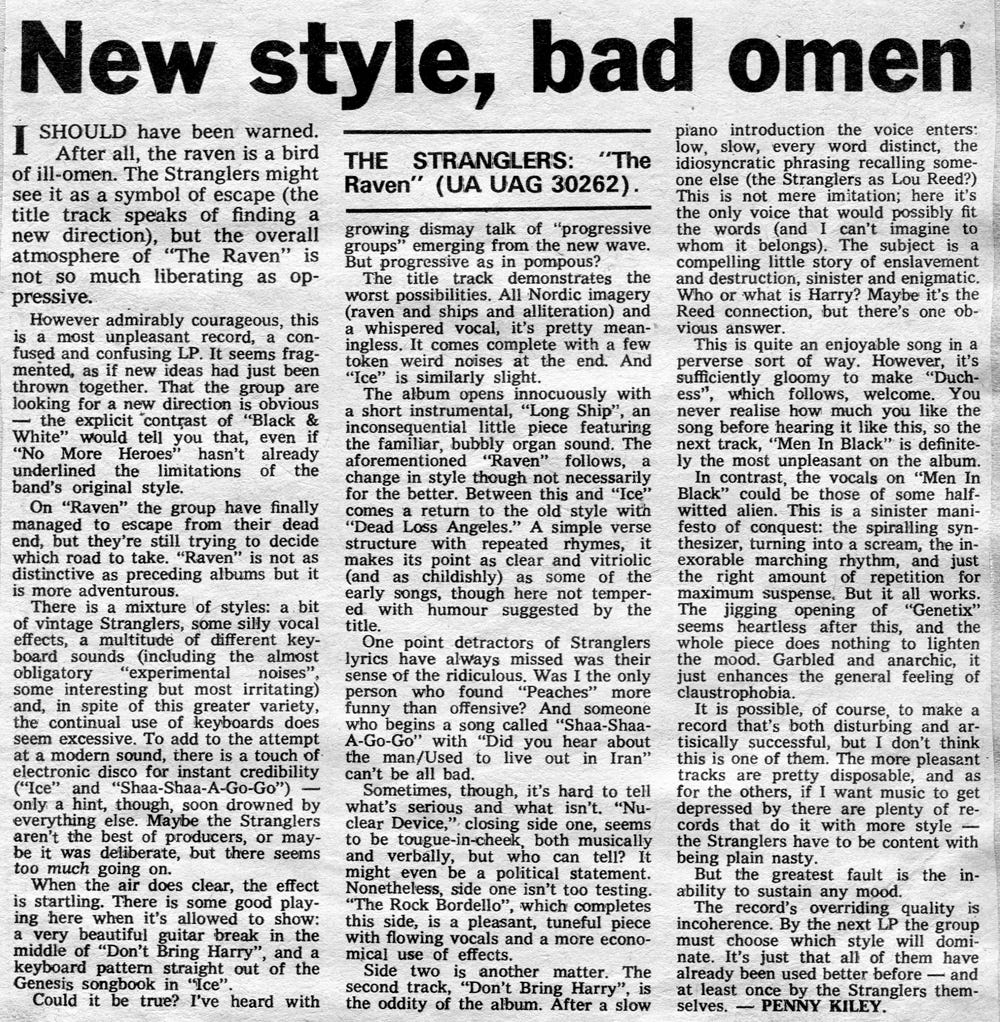About a year ago, I got an email via my business website telling me that I was wrong about this record. It seemed a long time to wait to tell me.
It turned out that someone had just put the review up on a fan page. And a fan had taken offence.
It’s actually quite hard to form an opinion about an LP when you’re up against the clock, especially when, as in this case, it was a change of direction for the band. I had only a few hours to listen to the record and write it up.
What happened was this. My then-husband worked at a record shop (the famous Probe Records in Liverpool), and a sales rep for the record company had given them a white label (advance) copy of the LP. This meant that, if I was quick, the Melody Maker could get their review in a week before their rivals (and a week before the official release date).
So, it was a rush job. But I did my best.
New style, bad omen
THE STRANGLERS: "The Raven"
MELODY MAKER, September 15, 1979
I SHOULD have been warned. After all, the raven is a bird of ill-omen. The Stranglers might see it as a symbol of escape (the title track speaks of finding a new direction), but the overall atmosphere of "The Raven" is not so much liberating as oppressive.
However admirably courageous, this is a most unpleasant record, a confused and confusing LP. It seems fragmented, as if new ideas had just been thrown together. That the group are looking for a new direction is obvious — the explicit "contrast of "Black & White" would tell you that, even if "No More Heroes" hasn't already underlined the limitations of the band's original style.
On "Raven" the group have finally managed to escape from their dead end, but they're still trying to decide which road to take. "Raven" is not as distinctive as preceding albums but it is more adventurous.
There is a mixture of styles: a bit of vintage Stranglers, some silly vocal effects, a multitude of different keyboard sounds (including the almost obligatory "experimental noises", some interesting but most irritating) and, in spite of this greater variety, the continual use of keyboards does seem excessive. To add to the attempt at a modern sound, there is a touch of electronic disco for instant credibility ("Ice" and "Shaa-Shaa-A-Go-Go") — only a hint, though, soon drowned by everything else. Maybe the Stranglers aren't the best of producers, or maybe it was deliberate, but there seems too much going on.
When the air does clear, the effect is startling. There is some good playing here when it's allowed to show: a very beautiful guitar break in the middle of "Don't Bring Harry", and a keyboard pattern straight out of the Genesis songbook in "Ice".
Could it be true? I've heard with growing dismay talk of "progressive groups" emerging from the new wave. But progressive as in pompous?
The title track demonstrates the worst possibilities. All Nordic imagery (raven and ships and alliteration) and a whispered vocal, it's pretty meaningless. It comes complete with a few token weird noises at the end. And "Ice" is similarly slight.
The album opens innocuously with a short instrumental, "Long Ship", an inconsequential little piece featuring the familiar, bubbly organ sound. The aforementioned "Raven" follows, a change in style though not necessarily for the better. Between this and "Ice" comes a return to the old style with "Dead Loss Angeles." A simple verse structure with repeated rhymes, it makes its point as clear and vitriolic (and as childishly) as some of the early songs, though here not tempered with humour suggested by the title.
One point detractors of Stranglers lyrics have always missed was their sense of the ridiculous. Was I the only person who found "Peaches" more funny than offensive? And someone who begins a song called "Shaa-Shaa-A-Go-Go" with "Did you hear about the man/Used to live out in Iran" can't be all bad.
Sometimes, though, it's hard to tell what's serious and what isn't. "Nuclear Device," closing side one, seems to be tongue-in-cheek, both musically and verbally, but who can tell? It might even be a political statement. Nonetheless, side one isn't too testing. "The Rock Bordello", which completes this side, is a pleasant, tuneful piece with flowing vocals and a more economical use of effects.
Side two is another matter. The second track, "Don't Bring Harry", is the oddity of the album. After a slow piano introduction the voice enters: low, slow, every word distinct, the idiosyncratic phrasing recalling someone else (the Stranglers as Lou Reed?) This is not mere imitation; here it's the only voice that would possibly fit the words (and I can't imagine to whom it belongs). The subject is a compelling little story of enslavement and destruction, sinister and enigmatic. Who or what is Harry? Maybe it's the Reed connection, but there's one obvious answer.
This is quite an enjoyable song in a perverse sort of way. However, it's sufficiently gloomy to make "Duchess", which follows, welcome. You never realise how much you like the song before hearing it like this, so the next track, "Men In Black" is definitely the most unpleasant on the album.
In contrast, the vocals on "Men In Black" could be those of some half-witted alien. This is a sinister manifesto of conquest: the spiralling synthesizer, turning into a scream, the inexorable marching rhythm, and just the right amount of repetition for maximum suspense. But it all works. The jigging opening of "Genetix" seems heartless after this, and the whole piece does nothing to lighten the mood. Garbled and anarchic, it just enhances the general feeling of claustrophobia.
It is possible, of course, to make a record that's both disturbing and artistically successful, but I don't think this is one of them. The more pleasant tracks are pretty disposable, and as for the others, if I want music to get depressed by there are plenty of records that do it with more style — the Stranglers have to be content with being plain nasty.
But the greatest fault is the inability to sustain any mood.
The record's overriding quality is incoherence. By the next LP the group must choose which style will dominate. It's just that all of them have already been used better before — and at least once by the Stranglers themselves.
Back in the 21st century
If you feel that you haven’t read enough words about Oasis lately, there are plenty more of them in How to Run an Indie Label by Alan McGee. I’ve just reviewed the book for Louder than War.
But even if (like me) you don’t much care about the band, there is lots more to enjoy in this rollercoaster ride through the history of Creation Records.





What a blast from the past, Penny, to get a complaint for something you wrote in 1979! That's hilarious.
What you said about the lyrics of Peaches reminds me that we had it on a mix tape in the car when my daughters were tots, it was one of their favourites and they used to sing along. Fortunately, they mis-heard the lyrics anyway. They thought it was a song about fruit and sang, "Walking on the bridges looking at the peaches." And they never picked up on the word clitoris, luckily.
Great stuff and some very fair points. It will always be my favourite Stranglers album even though I know it's not their best, at least partly because it was my introduction to the band - something I'm going to explore in an article soon 👍